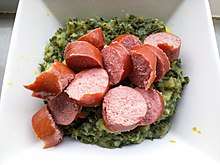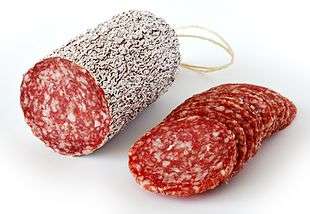Rookworst
Rookworst (Dutch pronunciation: [ˈroːkʋɔrst] (![]()
 | |
| Place of origin | Netherlands |
|---|---|
| Region or state | Northwestern Europe |
| Serving temperature | warm |
| Main ingredients | Pork and spices |
Rookworst was traditionally smoked over smouldering woodchips. Today, most commercially available rookworst is not smoked, but has smoke aromatics added to give the characteristic flavour.[3] Glucono delta-lactone is added to lower the pH and add to shelf life.[1]
There are two types of rookworst:
- The most common form of rookworst is a cooked sausage, sold in a vacuum pack. As this sausage leaves the factory already cooked, it is shelf-stable for weeks, and only needs to be reheated. This type of rookworst is also called Gelderse rookworst, i.e., rookworst from (or in the manner of) Gelderland.[4]
- Raw rookworst — also known as crafted, old-fashioned or butchers' rookworst — contains raw meats, and has to be prepared properly. Often this type of rookworst still uses natural intestine for the casing instead of bovine collagen. As the meat is raw, this type needs to be cooked before it can be safely eaten. A common method is to simmer the rookworst.[5]
A recipe from a Dutch cookbook of 1940 gives the proportions of ground meat as 4 parts of pork to 3 parts of veal and 3 parts of bacon. The mixture is salted and saltpeter, sugar and nutmeg are added before the meat is forced into pig intestines. The sausages are air-dried at 12 to 15 degrees C and then smoked at 18 to 20 degrees C.[6]
See also
References
- Leistner (1987). "Shelf-Stable Products: SSP and IMF based on Meat". In Larry R. Beuchat, Lous B. Rockland (ed.). Water activity: theory and applications to food: [proceedings of the tenth basic symposium held in Dallas, Texas, June 13–14]. CRC. pp. 304–28. ISBN 978-0-8247-7759-3.
- Witt, Robbert de (9 December 2006). "Geen rookworst voor Nederlanders in Indonesië". Elsevier (in Dutch). Archived from the original on 3 November 2014. Retrieved 22 October 2014.
- Tucker, Heather. "Dutch Delights:Rookworst". cloggiecentral.com. Retrieved 22 October 2014.
- Rahman, Shafiur (2007). Handbook of food preservation. CRC. pp. 876, 880. ISBN 978-1-57444-606-7.
- Blommestein, Irene van; Annelène van Eijndhoven; José van Mil (2002). Kook ook. Immerc. p. 387. ISBN 978-90-6611-287-2.
- McG, Dan. "Dutch Rookworst Recipe". sausagemaking.org. Franco. Retrieved 22 October 2014.
